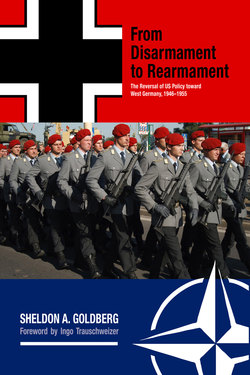Читать книгу From Disarmament to Rearmament - Sheldon A. Goldberg - Страница 9
На сайте Литреса книга снята с продажи.
ОглавлениеAcknowledgments
This work is the result of a significant amount of research I completed at the ripe young age of seventy-two after finally retiring from forty-six years of military and civil service. I am fortunate to have had the true and constant support of a number of scholars and others who were and remain very important to me. First of all, I need to acknowledge my wife, Waltraud, who like so many other dedicated military wives spent many years accompanying me and moving our family from base to base and country to country throughout my US Air Force career. She then tolerated my long hours and other absences while working for the federal government following my retirement from the air force and then, when I finally retired and we entered our “golden years,” stood by as I embarked upon my quest for greater knowledge of military and political history. Next in line is Dr. Jeffrey Herf, who took me under his wing and opened up to me the world of modern European history, especially archival research. His challenge led me on a journey that continues to hold me in awe. Dr. Jon Tetsuro Sumida, a naval historian of renown, made military history more relevant and understandable to me than it had ever been, even after my thirty years of military service, and showed me that it was much more than just generals and battles. He, too, was a most valuable critic and supporter. I also need to thank Dr. Melvyn Leffler for the time he spent with me over a long lunch in Washington, DC, and for the insights he shared regarding US-European policy during the period covered by this book.
Outside of the University of Maryland, where much of my research took place, my thanks go to the archivists of the Modern Military Records Branch, especially Mr. Richard Boylan, and the archivists of the Diplomatic Branch at the National Archives in College Park, Maryland. All of them were instrumental in teaching me how to use the archive’s resources to find those records upon which the majority of this work is based.
Further afield, I must thank Dr. Randy Sowell of the Harry S. Truman Presidential Library, who made my short stay very productive, and Dr. Christopher Abraham at the Dwight D. Eisenhower Presidential Library, who prepared my visit and made my research of pertinent records of the president and his advisors both easy and rewarding. Both of these gentlemen were also extremely helpful in answering questions and providing other information long after I departed.
Gary Trogden and James Tobias at the Center for Military History at Fort McNair were extremely helpful at the beginning and end of my research, especially in finding among their holdings several unpublished documents that contributed significantly to the early chapters. Dr. Gabriele Bosch of the Militärgeschichtliches Forschungsamt, Potsdam, Germany, was extremely helpful and not only graciously provided me with references to relevant German literature but also sent me copies of hard-to-find German journal articles via post and as e-mail attachments. I also greatly appreciate David Read, archivist at the Soldiers of Gloucestershire Museum, Gloucester, England, for his help in providing me with biographical information on Brigadier T. N. Grazebrook.
I need to thank Dr. Malcolm “Kip” Muir Jr., who encouraged me to enter the VMI Adams Center Cold War Essay contest, and to the judges who found an abridged version of my chapter on Operation Eclipse worthy of an award. I would also like to thank the officers of Phi Gamma Phi, who selected me to receive a Love of Learning grant. This grant gave me a very welcome impetus to venture outside my comfort zone in College Park, Maryland, and continue my research at the Harry S. Truman and Dwight D. Eisenhower Presidential Libraries.
To both Dr. Mark Mandeles and Harry Yeide, former colleagues, long-time friends, military historians, and authors in their own rights, my gratitude for their thorough reviews and thoughtful comments as I prepared the final manuscript. Last but not least, I extend my sincerest thanks to my very good friend and excellent military historian Dr. Ingo Trauschweitzer, whose scholarly advice, encouragement, and comments on my chapters were invaluable, and who helped me keep my goal in sight.
